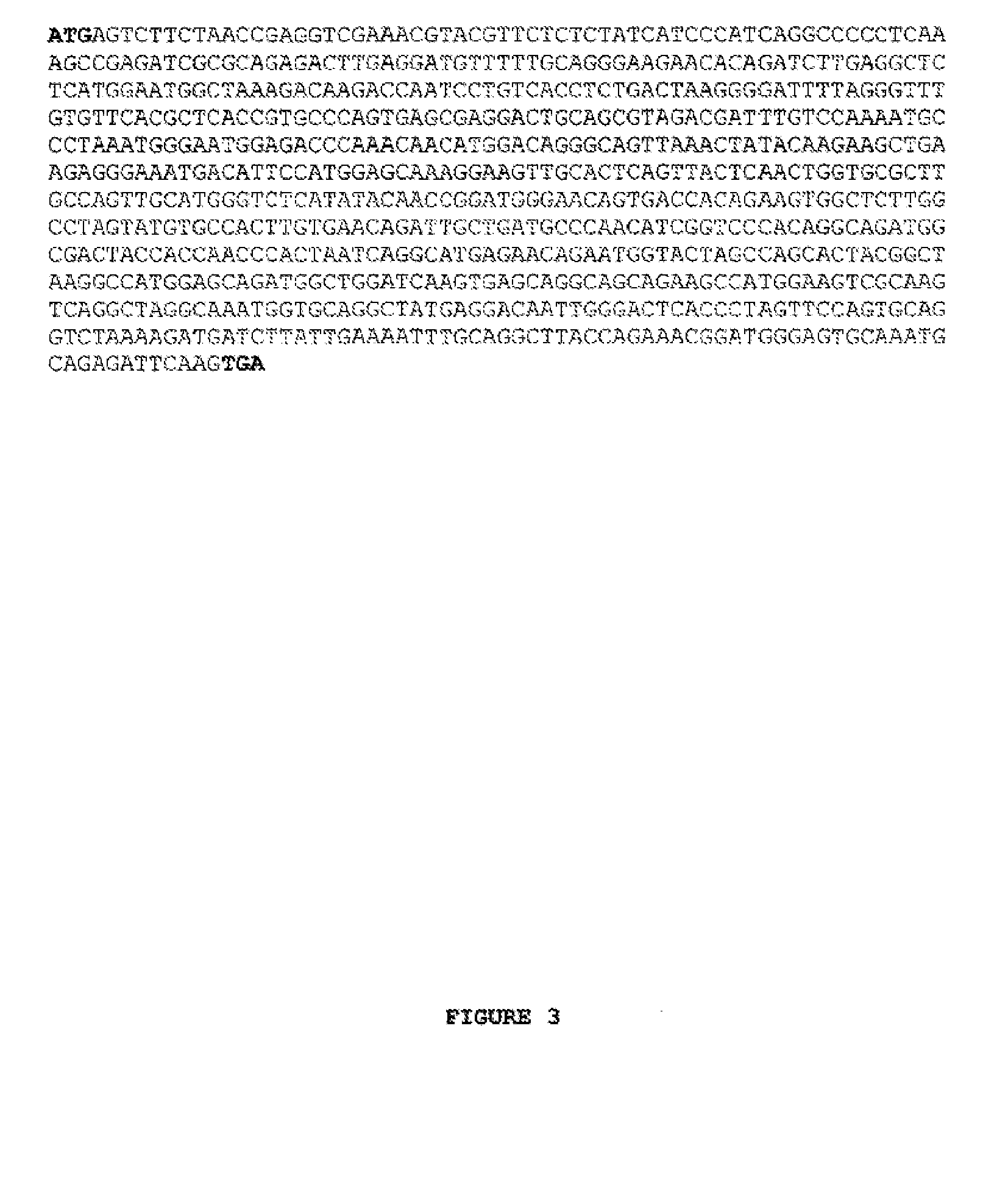Highly efficient influenza matrix (M1) proteins
a technology of matrix proteins and influenza viruses, applied in the field of high-efficiency influenza matrix proteins, can solve the problems of influenza vaccine strains that cannot replicate well in embryonated chicken eggs, limiting flexibility, delays and shortages in production and distribution, etc., and achieve the effect of reducing the severity of influenza, preventing or reducing the chance of influenza virus transmission
- Summary
- Abstract
- Description
- Claims
- Application Information
AI Technical Summary
Benefits of technology
Problems solved by technology
Method used
Image
Examples
example 1
Materials and Methods
[0283]Avian influenza A / Hong Kong / 1073 / 99 (H9N2) virus HA, NA, and M1 genes were expressed in Spodoptera frugiperda cells (Sf-95 cell line; ATCC PTA-4047) using the baculovirus bacmid expression system. The HA, NA, and M1 genes were synthesized by the reverse transcription and polymerase chain reaction (PCR) using RNA isolated from avian influenza A / Hong Kong / 1073 / 99 (H9N2) virus (FIGS. 1, 2, and 3). For reverse transcription and PCR, oligonucleotide primers specific for avian influenza A / Hong Kong / 1073 / 99 (H9N2) virus HA, NA, and M1 genes were used (Table 1). The cDNA copies of these genes were cloned initially into the bacterial subcloning vector, pCR2.1TOPO. From the resulting three pCR2.1TOPO-based plasmids, the HA, NA, and M1 genes were inserted downstream of the AcMNPV polyhedrin promoters in the baculovirus transfer vector, pFastBac1 (InVitrogen), resulting in three pFastBac1-based plasmids: pHA, pNA, and pM1 expressing these influenza virus genes, respec...
example 2
RT-PCR Cloning of Avian Influenza A / Hong Kong / 1073 / 99 Viral Genes
[0296]It is an object of the present invention to provide synthetic nucleic acid sequences capable of directing production of recombinant influenza virus proteins. Such synthetic nucleic acid sequences were obtained by reverse transcription and polymerase chain reaction (PCR) methods using influenza virus natural genomic RNA isolated from the virus. For the purpose of this application, nucleic acid sequence refers to RNA, DNA, cDNA or any synthetic variant thereof which encodes the protein.
[0297]Avian influenza A / Hong Kong / 1073 / 99 (H9N2) virus was provided by Dr. K. Subbarao (Centers for Disease Control, Atlanta, Ga., USA). Viral genomic RNA was isolated by the acid phenol RNA extraction method under Biosafety Level 3 (BSL3) containment conditions at CDC using Trizol LS reagent (Invitrogen, Carlsbad, Calif. USA). cDNA molecules of the viral RNAs were obtained by reverse transcription using MuLV reverse transcriptase (I...
example 3
RT-PCR Cloning of Human Influenza A / Sydney / 5 / 94 (H3N2) Viral Genes
[0298]Influenza A / Sydney / 5 / 97 (H3N2) Virus was obtained from Dr. M. Massare (Novavax, Inc., Rockville, Md.). Viral genomic RNA was isolated by the RNA acid phenol extraction method under BSL2 containment conditions at Novavax, Inc. using Trizol LS reagent (Invitrogen). cDNA molecules of the viral RNAs were obtained by reverse transcription and PCR using oligonucleotide primers specific for HA, NA, M1, M2, and NP proteins (Table 1). The PCR fragments were cloned into the bacterial subcloning vector, pCR2.1TOPO, between Eco RI sites that resulted in five recombinant plasmids, containing the HA, NA, M1, M2, and NP cDNA clones.
PUM
 Login to View More
Login to View More Abstract
Description
Claims
Application Information
 Login to View More
Login to View More - R&D
- Intellectual Property
- Life Sciences
- Materials
- Tech Scout
- Unparalleled Data Quality
- Higher Quality Content
- 60% Fewer Hallucinations
Browse by: Latest US Patents, China's latest patents, Technical Efficacy Thesaurus, Application Domain, Technology Topic, Popular Technical Reports.
© 2025 PatSnap. All rights reserved.Legal|Privacy policy|Modern Slavery Act Transparency Statement|Sitemap|About US| Contact US: help@patsnap.com



